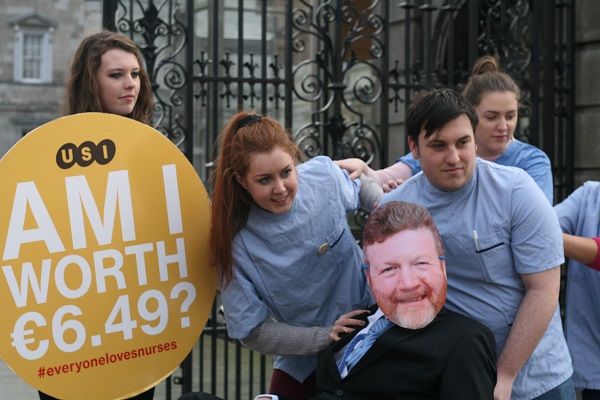Student nurses and midwives have been let down by the government once again. Despite an agreement reached by unions, the HSE and the Department of Health just before Christmas, they are still being paid at a rate of just €6.49 an hour.
Interns have been left confused as to what the actual situation is. In an email sent yesterday to all nursing and midwifery class reps, seen by The University Times, Dean Flanagan, Student and New Graduate Officer of the Irish Nurses and Midwives Organisation (INMO), has sought a meeting with students this Thursday, February 18th. He stated in the email: “The student pay dispute will come to a front this week.”
The email goes on to attribute a lack of engagement on the part of Department of Public Expenditure, led by Minister Brendan Howlin. It states that “this morning”, correspondence was finally initiated from the department.
Flanagan states that the meeting with class reps on Thursday will “seek to update on final talks happening over the next two days” and decide on the “response that will come from the ground dependent on the outcome”.
In an email from the Minister for Health to a Trinity student, sent on February 4th and seen by The University Times, Leo Varadkar maintained that while he had a “strong desire that we value and retain young nurses in Ireland”, his recommendation for increased pay still had be “ratified and implemented” by the Department of Public Expenditure.
Varadkar went on to say that this would “be done in the period ahead but I can’t say exactly when, given that the Dáil is dissolved and the election is on the way”.
The INMO previously contacted all fourth-year interns regarding the issue, acknowledging in a letter sent on February 3rd, seen by The University Times, that the “matter is frustrating” for them. However, despite the December 23rd agreement and “formal notification” that the Minister of Health has signed off on the proposals, progress now seems to be at a standstill.
Highlighting the current situation faced by interns, one Trinity student, Bose Allen, who is currently interning at Tallaght Hospital, showed The University Times her payslip, which showed that she was paid just €374 after tax for working 114 hours in three weeks. This equates to a mere €3.28 an hour.
The roadblock appears to be originating from the Department of Public Expenditure and Reform. In an email seen by The University Times, Michelle O’Connor, Private Secretary to the Minister for Public Expenditure and Reform wrote: “The national pay rate system upon which the student nurses rate is based is designed to reflect the fact that the training and qualification process is still in progress”.
The email, received on February 12th, goes on to say that the Department of Health and the Department for Public Expenditure are “in communication” with each other in relation to the issue. It states that both issues surrounding pay and incremental credit are “under examination” with “an outcome to that process…presently awaited”.
Varadkar has previously noted that the rate of pay would be marginally changed to bring it in line with the increased minimum wage brought about by Budget 2016. As The University Times reported in December, Minister Varadkar confirmed that the percentage rise in the national minimum wage would be reflected in nurses’ internship payments this year. This considered, the rate of €6.49 an hour still being paid to interns appears to violate this decision.
Unlike nurses in their first three years of training, fourth-year interns have full responsibilities while working. These include managing their own caseload of patients and conducting all nursing activities bar those relating to the administration of medicines.







